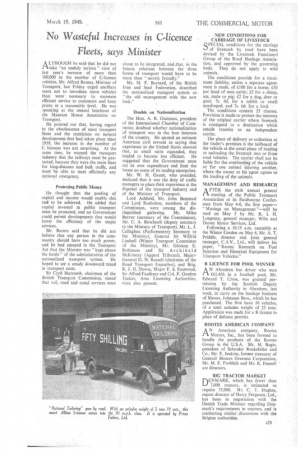No Wasteful Increases in Glicence Fleets, says Minister
Page 25

If you've noticed an error in this article please click here to report it so we can fix it.
ALTHOUGH he said that he did not take "an unduly serious" view of last year's increase of more than 100,000 in the number of C-licence vehicles, Mr. Alfred Barnes, Minister of Transport, last Friday urged ancillary users not to introduce more vehicles than were necessary to maintain efficient service to customers and keep prices at a reasonable level. He was speaking at the annual luncheon of the Mansion House Association on Transport.
He pointed out that, having regard to the obsolescence of most transport fleets and the restriction on natural developmentthat had taken place since 1939, the increase in the number of C licences was not surprising. At the same time, he warned the transport industry that the railways must be protected, because they were the main lines for long-distance and bulk traffic, and must be able to meet efficiently any national emergency.
Protecting Public Money He thought that the pooling of capital and income would enablethis end to be achieved. He added that capital invested in public transport must be protected, and no Government could permit developments that would lower the efficiency of the staple services.
Mr. Barnes said that he did not believe that any person in the community should have too much power, and he had ensured in the Transport Act that the Minister was " kept above the battle" of the administration of the nationalized transport system. He hoped to see a steady downward trend in transport costs.
Sir Cyril Hurcomb, chairman of the British Transport Commission, stated that rail, road and canal services were about to be integrated, and that, in the future, relations between the three forms of transport would have to be more than "merely friendly."
Mr. M. F. Barnard, of the British Iron and Steel Federation, described the nationalized transport system as "the old management with the new look."
Doubts on Nationalization
The Hon. A. R. Guinness, president of the International Chamber a Commerce, doubted whether nationalization of transport was in the best interests of the country. He quoted an eminent American civil servant as saying that experience in the United States showed that, as small units expanded, they tended to become less efficient. He suggested that the Government must cut its own expenditure and limit the losses on sonic of its trading enterprises.
Mr. W. H. Gaunt, who presided, declared that it was the duty of traffic managers to place their experience at the disposal of the transport industry and of the Minister of Transport.
Lord Ashfield, Mr. John Benstead and Lord Rusholme, members of the Commission, were among the distinguished gathering. Mr. Miles Beevor (secretary of the Commission), Mr. C. A. Birtchnell (deputy secretary to the Ministry of Transport), Mr. L. J. Callaghan (Parliamentary Secretary to the Ministry), General Sir Wilfrid Lindsell (Winter Transport Committee of the Ministry), Mr. Gleeson E. Robinson and Sir Archibald McKinstry (Appeal Tribunal), MajorGeneral G. N. Russell (chairman of the Road Transport Executive), and Brig. R. J. O. Dowse, Major F. S. Eastwood, Sir Alfred Faulkner and Col. F. Gordon Tucker, Area Licensing Authorities, were also present.












































































